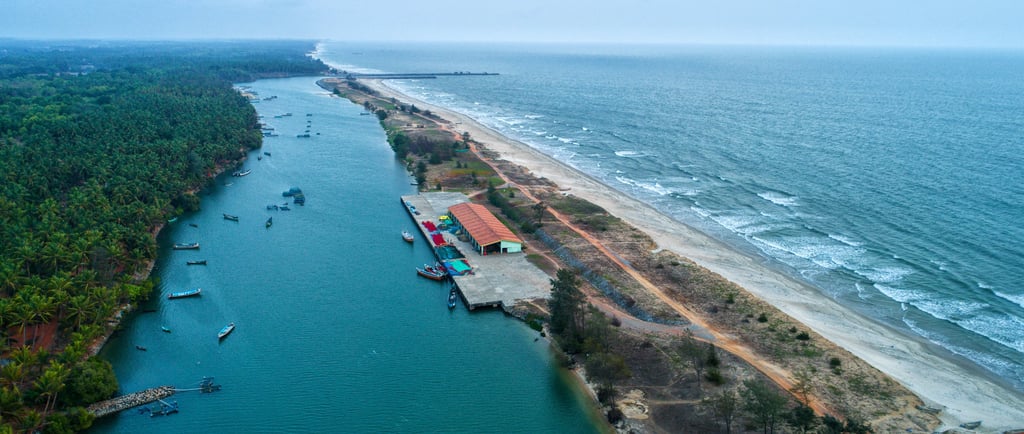Why Coastal Karnataka Must Evolve Beyond the Ordinary and Compete Globally
Coastal Karnataka holds immense untapped potential, yet continues to face a growing brain drain as youth migrate to overcrowded cities. With AI disrupting traditional jobs and tourism facing sustainability challenges, the region must rethink its growth model. Investing in infrastructure, easing regulations, and attracting global industries can transform it into a future-ready economic powerhouse. Read More
Anudeep Hegde
7/14/20253 min read


The Global Opportunity We’re Missing
Across India, global companies are flocking to tier-1 cities. But those cities are now choking under their own growth—traffic congestion, sky-high cost of living, deteriorating air quality, and a strained urban lifestyle. Bengaluru, once known as India’s Silicon Valley, is facing an exodus of talent due to unlivable conditions. People work in air-conditioned buildings but walk out into chaos. Compare this to Coastal Karnataka, where peace, fresh air, friendly communities, and access to nature still define everyday life.
A walk on the beach after a stressful day can do more for mental health than a dozen therapy apps. And yet, this life remains a secret, while cities continue to bear the brunt of over-urbanization.
A Generation That’s Moving Out
Talk to any young student here, and you’ll likely hear one thing: “I want to finish college and move to Bengaluru.” And they do. Because the region doesn’t offer the kind of opportunities their education deserves. Worse, there’s a growing mismatch—women, now more aspirational and educated than ever, find it harder to find career-matching partners or job roles locally. The result is a cultural shift that’s displacing more than just jobs.
Agriculture and fishing—our traditional backbones—are no longer enough. Farming is no longer profitable for many families. The fishing industry, meanwhile, is a fragile and limited-resource economy. Increasing pressure on marine ecosystems could lead to irreversible damage.
If we don’t act now, will we become like the rural towns of Europe—charming but hollowed out, with elderly citizens left behind while the youth chase dreams elsewhere?
AI Is Here—and It Will Reshape Everything
Artificial Intelligence is not just a buzzword—it’s a disruptive force. It's already reducing the need for traditional job roles. Automation is replacing labor in ways never imagined before. Finding physical labor for agriculture, fishing, or construction is already becoming a challenge, and it will only get worse.
This should not be a wake-up call; it should be an action call.
What Coastal Karnataka Needs
The region has everything investors look for:
Smart, adaptable population
Clean environment and quality of life
Rich culture, food, and hospitality
Peaceful, low-disruption communities
Untapped connectivity via coast, air, and rail
Potential for seamless connectivity from Coast to Bangalore will be a game changer
What’s truly lacking is robust infrastructure and global recognition. Imagine the possibilities if we introduced a few more airports, modernized our seaports, enhanced rail connectivity, and implemented transparent, business-friendly policies free from corruption and bureaucratic red tape. Coastal Karnataka could become a hub for:
Green-tech industries
Remote-first IT campuses
Medical and wellness tourism
Agritech innovation centers
Creative and cultural industries
Major Export Hub
A Major Transshipment Hub
This wouldn’t just benefit the region—it would reduce the pressure on cities like Bengaluru, create wealth, and bring people back to their hometowns with pride.
Tourism Is Not Enough
While tourism has become the new hope for many, it is not a sustainable standalone model. Over-dependence on tourism can lead to over-tourism, environmental degradation, and seasonality issues. Many tourism stakeholders are already facing challenges with unpredictable demand, lack of support, and infrastructure gaps.
Tourism should be one piece of the puzzle not the whole puzzle. Adding to the complexity are increasing global conflicts, economic slowdowns in European and American markets, and the aggressive tourism strategies of other Southeast Asian countries. These factors make it even more challenging to remain competitive and attractive as a destination. Unless we loosen outdated regulations, simplify processes, and adopt a truly tourist-friendly approach, we risk losing out to regions that are more adaptive and welcoming.
What Next?
It’s time for stakeholders—local entrepreneurs, government bodies, educational institutions, and returning professionals to come together and build a new vision for Coastal Karnataka. One that values:
Innovation over imitation
Collaboration over competition
Regeneration over exploitation
Because if we don’t ask “What next?” now, the question will be asked of us later—when the damage is done, the youth are gone, and the region becomes a story of lost potential.
Let’s rewrite that story. Let’s evolve beyond normal.
In the rapidly evolving global job market, the pressure on young graduates is higher than ever. For students graduating from Coastal Karnataka, the trend is clear: leave. Many are moving out of their hometowns in search of better opportunities, often landing in overcrowded cities like Bengaluru, Pune, or even abroad. But as someone who has lived in cities like Bengaluru, Delhi, and even Bahrain for over 15 years and has now returned home I see things differently. Coastal Karnataka is not just a region with natural beauty; it's a region with untapped potential.
We are blessed coastlines, lush greenery, rivers, clean air, rich culture, peace-loving and fast-adapting people. Yet, our systems have not evolved to match the potential. While some regions of the world lack talent, connectivity, or natural resources, Coastal Karnataka suffers from something else entirely—a lack of vision and unified intent.
And while it's true that the region has grown immensely compared to many other parts of Karnataka, that doesn't mean we've reached our ceiling. In fact, what we've achieved so far may only scratch the surface. The real potential is limitless—but it remains largely unexplored.
Anudeep Hegade
Seasoned Internet Marketing Specialist and Hotel Marketing Expert with over 12+ years of experience helping brands grow and succeed online.
Get in touch
connect@anudeephegde.com
+91 9449507266, +91 9731258717
© 2025. All rights reserved. @Trip Nirvigna Marketing